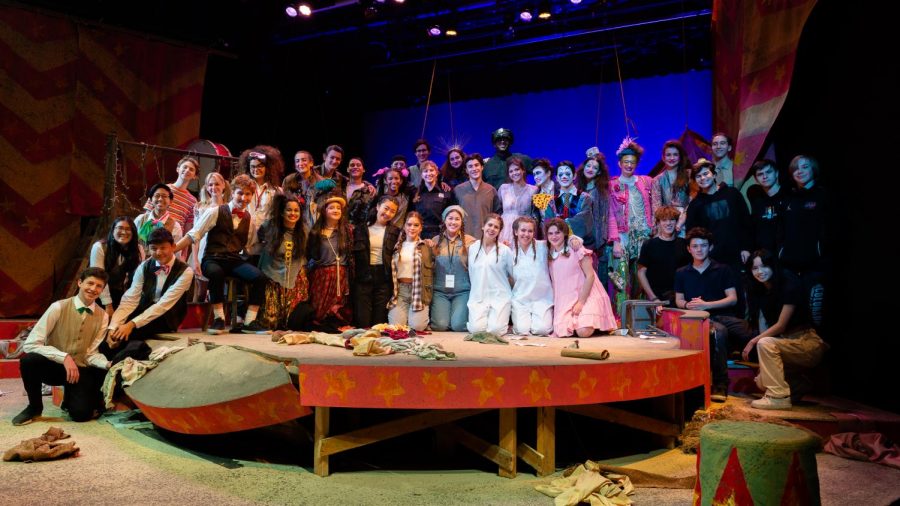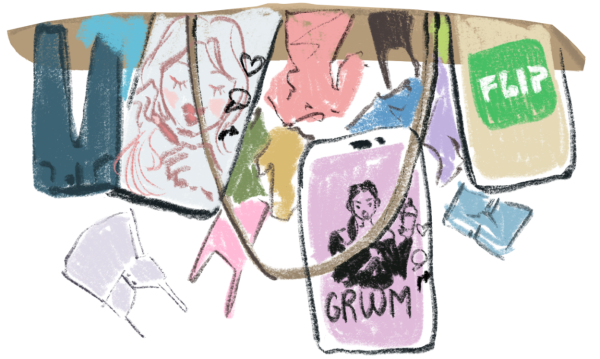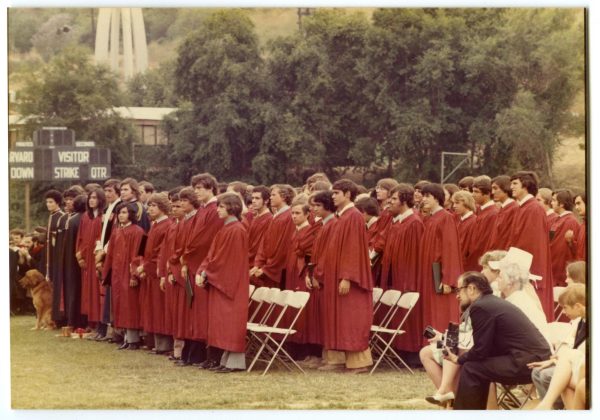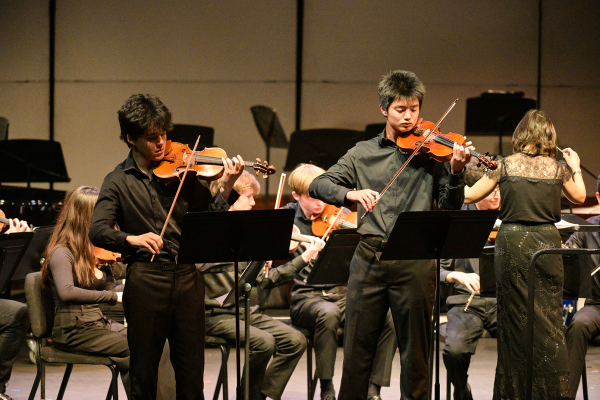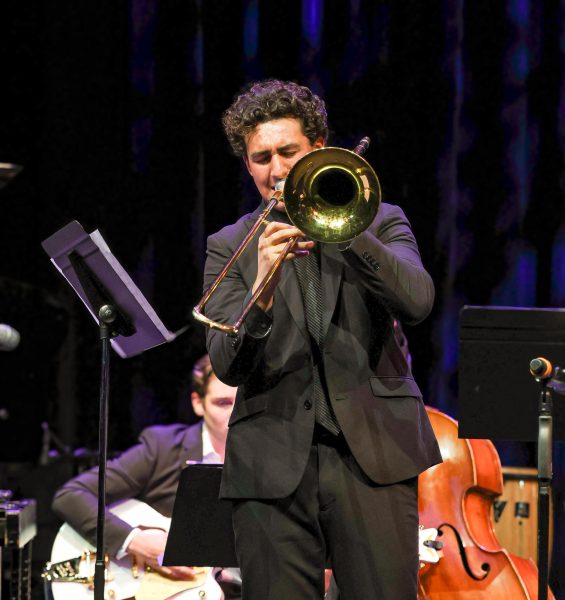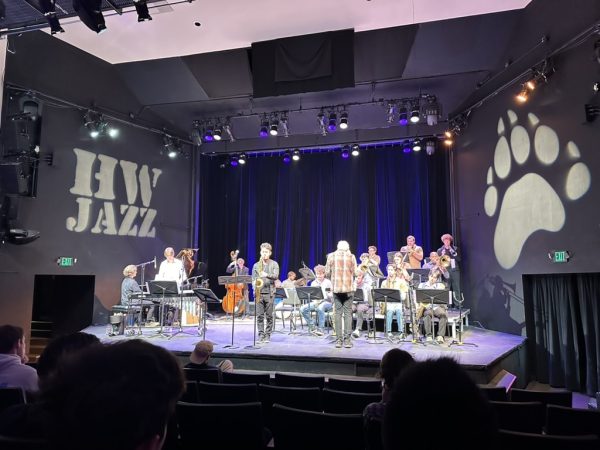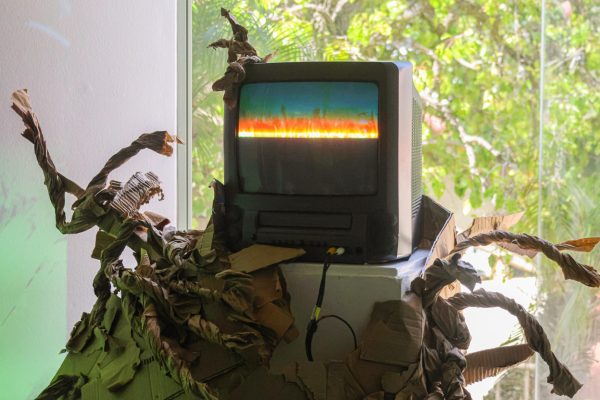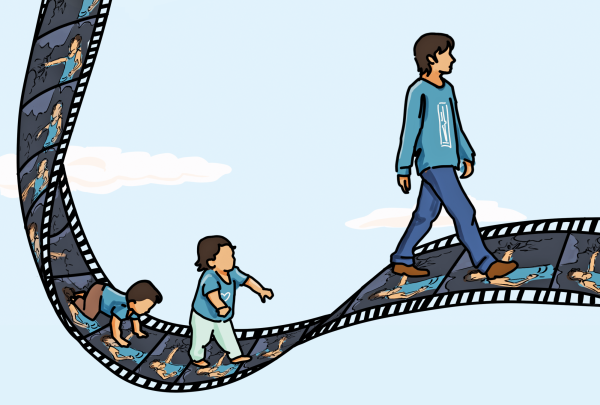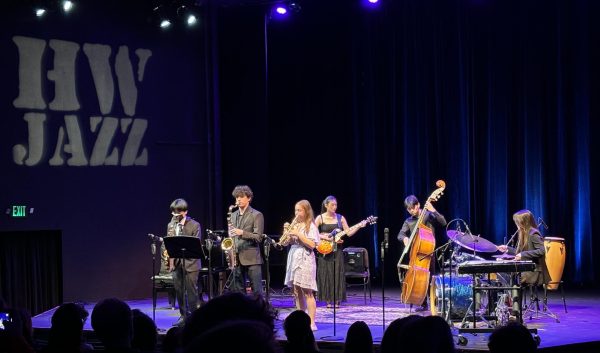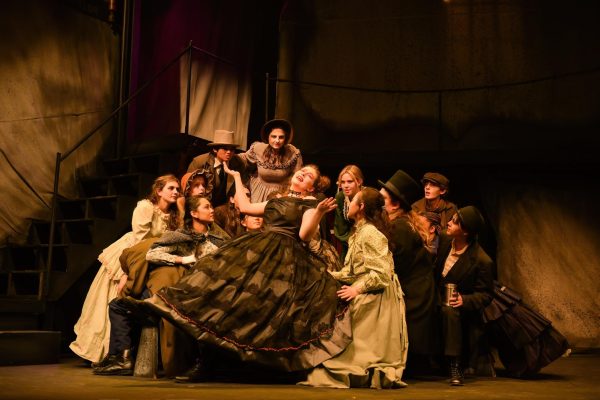Fall Play: ‘JB’
Thespians gather for a group photo after a performance of “J.B.”.
November 17, 2021
It is hard to be optimistic sometimes, but believing in good helps to work things out in the end.
— Peyton West '23
The upper school Performing Arts Department opened the fall play, “J.B.,” to audiences in Rugby Theater on Oct. 29, 30 and 31. The show marked the first large-scale in-person Performing Arts production since the onset of the COVID-19 pandemic.
Written in 1958 by American poet Archibald Macleish, “J.B.” is a modernist interpretation of the biblical Book of Job, in which God permits the Devil to test the faith of a deeply religious farmer named Job. In the play, Job is reimagined as J.B., an affluent banker who endures great moral trials from two circus vendors. The production won the 1959 Pulitzer Prize for Drama and the 1959 Tony Award for Best Play.
Performing Arts Teacher and Director Bev Meyer, who proposed “J.B.” as this year’s fall play, said her past experience with the play inspired her to direct it again.
“I read [‘J.B.’] years ago, did a shortened version of it at another school and always loved it,” Meyer said. “I had recently reread it and remembered how much I loved it. I brought it in to [Pugh] last spring when he and I were looking for a play to produce in the fall. He fell in love with it too, and that was it.”
Through its biblical allusions and modern narratives, “J.B.” explores themes of religion, suffering, family and hopelessness. Its first half recounts the moral trials God and Satan put J.B. through, including the loss of his family and material possessions, while the second half focuses on his own internal faith and doubt. As a stagecraft student and an audience member on opening night, Peyton West ’23 said “J.B” reminded her to stay optimistic amid difficult times.
“[The play] can really teach audience members about the power of believing, and not necessarily in a strictly religious way,” West said. “It is hard to be optimistic sometimes, but believing in good helps to work things out in the end.”
Shanti Hinkin ’22, who plays J.B.’s wife Sarah, said the play prompted her to consider the ways good people can face agonizing struggles.
“Job is treated as this kind of circus puppet by God and Satan, which the [set design- ers] of ‘J.B.’ [highlighted] really well. It is quite haunting when you really think about it,” Hinkin said. “The play can be seen as religious or completely non-religious, and either way, it’s a story about love in all of its powerlessness to the evils of the world, as well as its power in rebuilding ourselves even in the face of terror.”
Audition sign-ups opened the first day of school and students were called back throughout the second week of the academic year. Roles were open to students of all identities, regardless of the original script’s intentions regarding gender and race for each role. Meyer said every student who auditioned received a part. Student musicians composed an original score for the production and performed it live. With the guidance of Meyer, Pugh and Technical Director Aaron Martin, student stage managers helped construct stage sets and operate sound and lighting.
Spotlight Operator Manu Markman said helping the production behind the scenes was a fun and refreshing experience.
“With the amount of work [stagecraft] puts in, we always hope the community will enjoy the production,” Markman said. “Whenever you get to try something new, you can always learn from it. That’s why I love doing stagecraft.”
Actors wore protective face masks while performing until dress rehearsals for the production and underwent biweekly COVID-19 testing. Meyer said these circumstances provided unique challenges for the cast.
“[Masks] made it harder for the actors to be heard and understood, and also made it difficult to see facial expressions,” Meyer said. “We’re so happy that [the Community Health Office] figured out a way to let us do the play without masks.”
Samuel Hines ’24 plays a police officer in the production. He said the rehearsal process was both individual and collective for the cast, resulting in a more cohesive final product.
“Rehearsals were constructed to work through each scene separately before slipping each piece into its place, and each and every actor created a background story for their characters in order to bond and connect with the story in their own personal way,” Hines said. “While ‘J.B.’ is a beautiful play, it is also a puzzle. It is made up of many different pieces that we worked as a cast to put together for our [school] audience.”
In her director’s note, Meyer said the central themes of “J.B” have become even more important follow- ing the pandemic.
“Like Job’s world, ours, too, was hit by a disaster that frightened millions, killed hundreds of thousands and cut us off from the human touch of our fellow beings for too long,” Meyer wrote in her director’s note. “More than anything, we have reveled in the glow of each other’s company––despite being masked until the last week of rehearsal––and have been so thankful to be together again after the difficult isolation of the last year and a half.”































